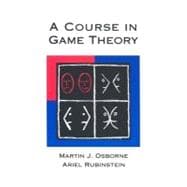
Note: Supplemental materials are not guaranteed with Rental or Used book purchases.
Purchase Benefits
Looking to rent a book? Rent A Course in Game Theory [ISBN: 9780262650403] for the semester, quarter, and short term or search our site for other textbooks by Osborne, Martin J.; Rubinstein, Ariel. Renting a textbook can save you up to 90% from the cost of buying.
| Preface | xi | ||||
|
1 | (8) | |||
|
1 | (1) | |||
|
2 | (1) | |||
|
3 | (1) | |||
|
4 | (1) | |||
|
5 | (1) | |||
|
6 | (1) | |||
|
6 | (3) | |||
|
8 | (1) | |||
| I Strategic Games | 9 | (78) | |||
|
11 | (20) | |||
|
11 | (3) | |||
|
14 | (1) | |||
|
15 | (4) | |||
|
19 | (2) | |||
|
21 | (3) | |||
|
24 | (7) | |||
|
29 | (2) | |||
|
31 | (22) | |||
|
31 | (6) | |||
|
37 | (7) | |||
|
44 | (4) | |||
|
48 | (5) | |||
|
51 | (2) | |||
|
53 | (14) | |||
|
53 | (5) | |||
|
58 | (4) | |||
|
62 | (5) | |||
|
64 | (3) | |||
|
67 | (20) | |||
|
67 | (6) | |||
|
73 | (2) | |||
|
75 | (1) | |||
|
76 | (5) | |||
|
81 | (6) | |||
|
84 | (3) | |||
| II Extensive Games with Perfect Information | 87 | (110) | |||
|
89 | (28) | |||
|
89 | (8) | |||
|
97 | (4) | |||
|
101 | (2) | |||
|
103 | (2) | |||
|
105 | (3) | |||
|
108 | (9) | |||
|
114 | (3) | |||
|
117 | (16) | |||
|
117 | (1) | |||
|
118 | (3) | |||
|
121 | (6) | |||
|
127 | (6) | |||
|
131 | (2) | |||
|
133 | (30) | |||
|
133 | (1) | |||
|
134 | (2) | |||
|
136 | (4) | |||
|
140 | (3) | |||
|
143 | (3) | |||
|
146 | (3) | |||
|
149 | (1) | |||
|
150 | (3) | |||
|
153 | (2) | |||
|
155 | (8) | |||
|
160 | (3) | |||
|
163 | (14) | |||
|
163 | (1) | |||
|
164 | (4) | |||
|
168 | (4) | |||
|
172 | (5) | |||
|
175 | (2) | |||
|
177 | (20) | |||
|
177 | (1) | |||
|
178 | (2) | |||
|
180 | (5) | |||
|
185 | (6) | |||
|
191 | (6) | |||
|
195 | (2) | |||
| III Extensive Games with Imperfect Information | 197 | (58) | |||
|
199 | (20) | |||
|
199 | (5) | |||
|
204 | (5) | |||
|
209 | (3) | |||
|
212 | (4) | |||
|
216 | (3) | |||
|
217 | (2) | |||
|
219 | (36) | |||
|
219 | (3) | |||
|
222 | (9) | |||
|
231 | (12) | |||
|
243 | (3) | |||
|
246 | (9) | |||
|
254 | (1) | |||
| IV Coalitional Games | 255 | (58) | |||
|
257 | (20) | |||
|
257 | (1) | |||
|
258 | (4) | |||
|
262 | (1) | |||
|
263 | (5) | |||
|
268 | (1) | |||
|
269 | (8) | |||
|
274 | (3) | |||
|
277 | (22) | |||
|
277 | (1) | |||
|
278 | (3) | |||
|
281 | (8) | |||
|
289 | (10) | |||
|
297 | (2) | |||
|
299 | (14) | |||
|
299 | (2) | |||
|
301 | (4) | |||
|
305 | (5) | |||
|
310 | (1) | |||
|
311 | (2) | |||
|
312 | (1) | |||
| List of Results | 313 | (8) | |||
| References | 321 | (20) | |||
| Index | 341 |
The New copy of this book will include any supplemental materials advertised. Please check the title of the book to determine if it should include any access cards, study guides, lab manuals, CDs, etc.
The Used, Rental and eBook copies of this book are not guaranteed to include any supplemental materials. Typically, only the book itself is included. This is true even if the title states it includes any access cards, study guides, lab manuals, CDs, etc.